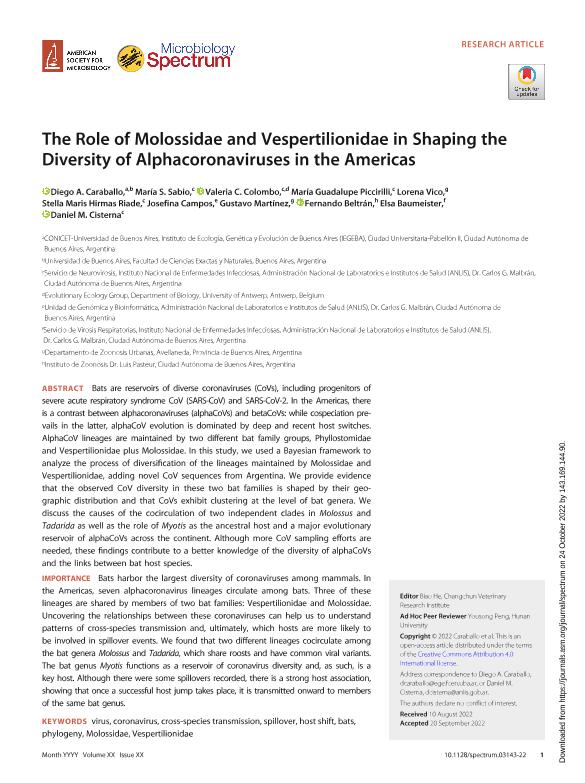Artículo
The Role of Molossidae and Vespertilionidae in Shaping the Diversity of Alphacoronaviruses in the Americas
Caraballo, Diego Alfredo ; Sabio, Maria Soledad; Colombo, Valeria Carolina
; Sabio, Maria Soledad; Colombo, Valeria Carolina ; Piccirilli, María Guadalupe; Vico, Lorena; Hirmas Riade, Stella Maris; Campos, Josefina; Martínez, Gustavo; Beltrán, Fernando; Baumeister, Elsa; Cisterna, Daniel Marcelo
; Piccirilli, María Guadalupe; Vico, Lorena; Hirmas Riade, Stella Maris; Campos, Josefina; Martínez, Gustavo; Beltrán, Fernando; Baumeister, Elsa; Cisterna, Daniel Marcelo
 ; Sabio, Maria Soledad; Colombo, Valeria Carolina
; Sabio, Maria Soledad; Colombo, Valeria Carolina ; Piccirilli, María Guadalupe; Vico, Lorena; Hirmas Riade, Stella Maris; Campos, Josefina; Martínez, Gustavo; Beltrán, Fernando; Baumeister, Elsa; Cisterna, Daniel Marcelo
; Piccirilli, María Guadalupe; Vico, Lorena; Hirmas Riade, Stella Maris; Campos, Josefina; Martínez, Gustavo; Beltrán, Fernando; Baumeister, Elsa; Cisterna, Daniel Marcelo
Fecha de publicación:
10/2022
Editorial:
American Society for Microbiology
Revista:
Microbiology Spectrum
ISSN:
2165-0497
Idioma:
Inglés
Tipo de recurso:
Artículo publicado
Clasificación temática:
Resumen
Bats are reservoirs of diverse coronaviruses (CoVs), including progenitors of severe acute respiratory syndrome CoV (SARS-CoV) and SARS-CoV-2. In the Americas, there is a contrast between alphacoronaviruses (alphaCoVs) and betaCoVs: while cospeciation prevails in the latter, alphaCoV evolution is dominated by deep and recent host switches. AlphaCoV lineages are maintained by two different bat family groups, Phyllostomidae and Vespertilionidae plus Molossidae. In this study, we used a Bayesian framework to analyze the process of diversification of the lineages maintained by Molossidae and Vespertilionidae, adding novel CoV sequences from Argentina. We provide evidence that the observed CoV diversity in these two bat families is shaped by their geographic distribution and that CoVs exhibit clustering at the level of bat genera. We discuss the causes of the cocirculation of two independent clades in Molossus and Tadarida as well as the role of Myotis as the ancestral host and a major evolutionary reservoir of alphaCoVs across the continent. Although more CoV sampling efforts are needed, these findings contribute to a better knowledge of the diversity of alphaCoVs and the links between bat host species.
Archivos asociados
Licencia
Identificadores
Colecciones
Articulos(IEGEBA)
Articulos de INSTITUTO DE ECOLOGIA, GENETICA Y EVOLUCION DE BS. AS
Articulos de INSTITUTO DE ECOLOGIA, GENETICA Y EVOLUCION DE BS. AS
Articulos(SEDE CENTRAL)
Articulos de SEDE CENTRAL
Articulos de SEDE CENTRAL
Citación
Caraballo, Diego Alfredo; Sabio, Maria Soledad; Colombo, Valeria Carolina; Piccirilli, María Guadalupe; Vico, Lorena; et al.; The Role of Molossidae and Vespertilionidae in Shaping the Diversity of Alphacoronaviruses in the Americas; American Society for Microbiology; Microbiology Spectrum; 10; 6; 10-2022; 1-12
Compartir
Altmétricas



